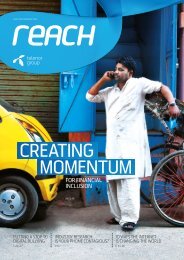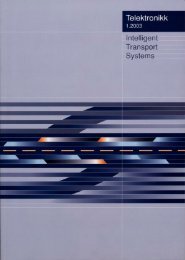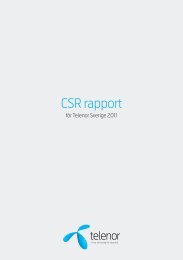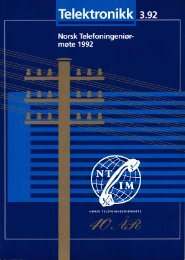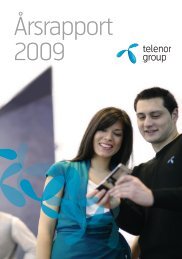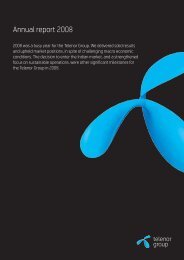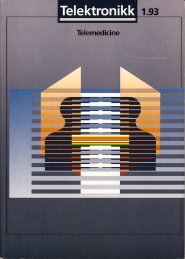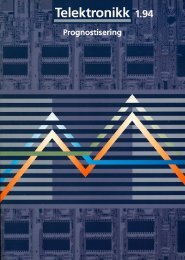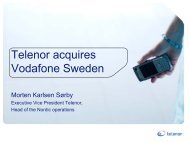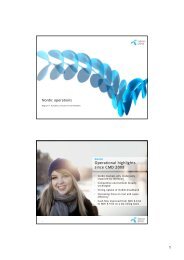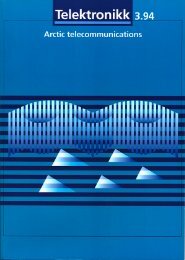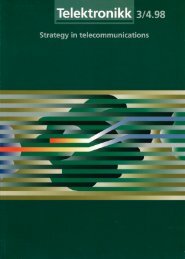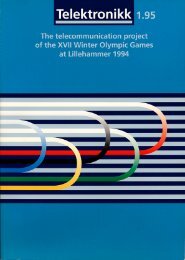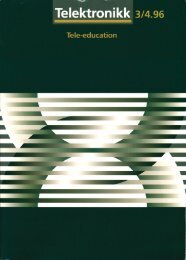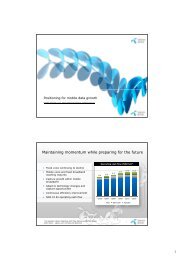You also want an ePaper? Increase the reach of your titles
YUMPU automatically turns print PDFs into web optimized ePapers that Google loves.
140<br />
with other SDOs (Standards Development<br />
Organisations) should be avoided and provision<br />
should be made for referencing outputs of SDOs<br />
in its output documents.<br />
Although many participants agreed that there<br />
was a need to adopt a flexible approach tailored<br />
to rapidly respond to market requirements, no<br />
agreement could be reached whether this necessitated<br />
a new set of working methods different<br />
from those of a regular SG.<br />
A number of important non-European players<br />
supported the establishment of a separate Study<br />
Group for IMT-2000 and could not endorse the<br />
European contribution. The compromise reached<br />
was to set up a new Special Study Group on<br />
IMT-2000 and beyond (SSG). The primary<br />
responsibility of this special SG is the overall<br />
network aspects of IMT-2000 and beyond,<br />
including wireless Internet, convergence of<br />
mobile and fixed networks, mobility management,<br />
mobile multimedia functions, interworking<br />
and interoperability. The SSG will be tasked<br />
with enhancing network interoperability among<br />
existing IMT-2000 systems specified by ITU-T<br />
and external standards development organisations<br />
(SDOs), Partnership Projects (PPs), IETF<br />
and relevant external forums and to provide a<br />
migration path regarding network aspects and<br />
mobility from existing IMT-2000 systems<br />
towards systems beyond IMT-2000. Care must<br />
be taken to avoid duplication of work being performed<br />
in the ITU-R, in other SDOs, in PPs<br />
(such as the Third Generation Partnership Project<br />
– 3GPP) and the IETF.<br />
The special SG on IMT-2000 and beyond (SSG)<br />
is special in the sense that the SSG will be<br />
allowed to apply the provisional working procedures<br />
set out in Recommendation A.9 approved<br />
by WTSA. The Special Study Group is encouraged<br />
to work electronically to the maximum<br />
extent possible. The Special Study Group is not<br />
bound by the rules governing the regular Study<br />
Groups concerning the frequency of physical<br />
meetings. Physical meetings may be announced<br />
electronically with a minimum of one month’s<br />
notice and contributions may be input up to<br />
five working days before the meetings.<br />
The Special SG on IMT-2000 and beyond is<br />
authorised to develop and approve Recommendations<br />
in the same manner as other Study<br />
Groups. The Special SG may also consider other<br />
deliverables of a status below that of an ITU<br />
Recommendation such as normative technical<br />
specifications or interim Recommendations. Proposals<br />
for such output should be submitted to the<br />
Telecommunication Standardization Advisory<br />
Group (TSAG) for consideration and approval.<br />
The provisions for such deliverables must, how-<br />
ever, be incorporated in the A-series Recommendations<br />
(containing ITU-T working procedures)<br />
and approved by TSAG following the traditional<br />
approval procedure including consultation of<br />
Member States.<br />
3 Appointment of SG<br />
Chairmen and Vice-Chairmen<br />
The candidates for chairmen and the vice-chairmen<br />
of the Study Groups are discussed at the<br />
meetings of heads of delegations of Member<br />
States (where Sector Members are not authorised<br />
to take part) and are finally appointed by the<br />
WTSA. Following a request from Europe to the<br />
TSB Director (Telecommunication Standardization<br />
Bureau, the secretariat of ITU-T), a list of<br />
all the candidates with their CVs and affiliation<br />
was available to the ITU members before the<br />
WTSA. It is the first time that the membership<br />
as a whole had access to information about the<br />
candidates and the number of candidates to the<br />
various posts prior to the WTSA and this transparency<br />
was much appreciated by <strong>Telenor</strong> and<br />
other participants.<br />
Although there is an evident need for ITU-T to<br />
have competent chairmen and vice-chairmen, the<br />
geographical balance and national interests are<br />
often given more weight when a candidate is<br />
chosen. For the new special SG on IMT 2000,<br />
there was a list of 11 candidates for the vicechairmanship.<br />
Unfortunately, WTSA was unable<br />
to select a limited number – instead all 11 candidates<br />
were appointed as vice-chairmen!<br />
In Study Group 2, there were two competing candidates<br />
for the chairmanship both coming from<br />
European members – UK and France. As no<br />
agreement on one candidate could be reached, it<br />
was decided to share the chairmanship and vicechairmanship<br />
by splitting the functions in periods<br />
of two years each. Such a solution has never<br />
before been practised in the ITU-T. It is disappointing<br />
that it was impossible to decide on one<br />
chairman, for example by using a vote. This is<br />
certainly a weakness of the present system.<br />
The WTSA also designated the chairman (Mr.<br />
G. Fishman, Lucent Techn., USA) and vicechairmen<br />
of the Telecommunication Standardization<br />
Advisory Group (TSAG) and agreed to<br />
limit the terms of office of all SG chairmen and<br />
vice-chairmen including those of TSAG to eight<br />
years (two SG periods).<br />
4 Role of Telecommunication<br />
Standardization Advisory<br />
Group (TSAG)<br />
A number of members of the ITU-T sector had<br />
raised their concern about the four-year cycle of<br />
the WTSA and questioned the sector’s ability to<br />
reach decisions responding to market needs. It<br />
Telektronikk 1.2001



